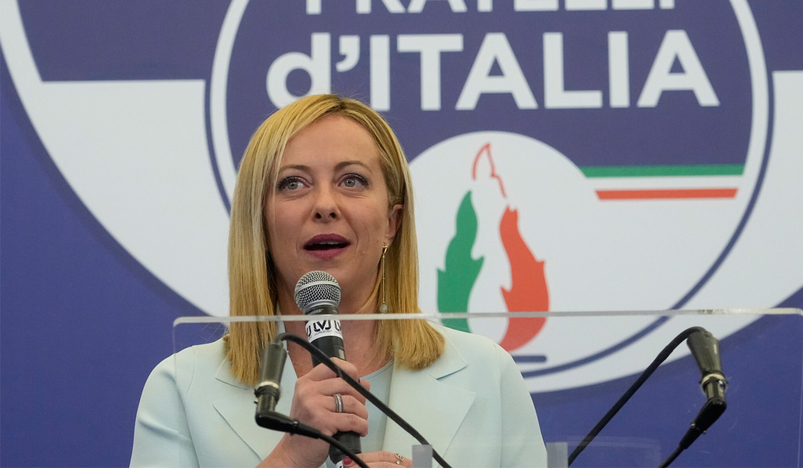
Giorgia Meloni
Giorgia Meloni won a clear majority in Sunday’s Italian election, based on partial results on Monday, setting her up to become the country’s first female prime minister — at the head of the most right-wing government since the Second World War.
Projections based on votes counted from about two-thirds of polling stations showed her euro-sceptic Brothers of Italy party before other contenders in Sunday’s balloting.
In a victory speech, the 45-year-old said: “If we are called to govern this nation, we will do it for everyone, we will do it for all Italians and we will do it with the aim of uniting the people.
“Italy chose us. We will not betray (the country) as we never have.”
The formation of a ruling coalition, with the help of Ms Meloni’s right-wing and centre-right allies, could take weeks.
Italy’s president gives the mandate to try to form a government after consultations with party leaders.
Former European Central Bank chief Mario Draghi, whose government collapsed two months ago, stays on in a caretaker role.
Ms Meloni has solidly backed the supplying of Ukraine with arms to defend itself against Russia’s invasion.
In contrast, right-wing League leader Matteo Salvini, who before the war was a staunch admirer of Russian President Vladimir Putin, has voiced concern that western sanctions could end up hurting Italy’s economic interests more that punishing those of Russia.
Former Premier Silvio Berlusconi, another long-time Putin admirer, has said that his inclusion in a centre-right bloc coalition would guarantee that Italy stays firmly anchored in the EU and one of its most reliable members.
With Italy’s households and businesses struggling with staggeringly high energy bills as winter approaches, Ms Meloni has demurred from Mr Salvini’s push to swell already-debt-laden Italy's borrowing by tens of billions of euros for energy relief.
What kind of government the eurozone’s third-largest economy might be getting was being closely watched in Europe, given Ms Meloni’s criticism of “Brussels bureaucrats” and her ties to other right-wing leaders.
She recently defended Hungary’s Prime Minister Viktor Orban after the European Commission recommended suspending billions of euros in funding to Hungary over concerns about democratic backsliding and the possible mismanagement of EU money.
EU is 'complex'
After opinion polls in the run-up to the vote indicated she would win, Ms Meloni started moderating her message of “God, homeland and family” in an apparent attempt to reassure the EU and other international partners, worried about euro-scepticism.
“This is the time for being responsible,” Ms Meloni said, appearing live on television and describing the situation for Italy and the EU is “particularly complex”.
In her campaign, she criticised EU officials as being overly bureaucratic and vowing to protect Italy’s national interests if they clashed with EU policies.
Projections based on votes counted from nearly two-thirds of the polling stations in Sunday’s balloting indicated Ms Meloni’s Brothers of Italy party would win about 25.7 per cent of the vote.
The closest challenger, the centre-left Democratic Party of former Premier Enrico Letta, is set to get about 19.3 per cent.
.jpg)
Qatar Secures Place Among the World's Top 10 Wealthiest Nations
.jpg)
Hamad International Airport Witnesses Record Increase in Passenger Traffic

Saudi Arabia: Any visa holder can now perform Umrah

What are Qatar's Labour Laws on Annual Leave?
Leave a comment